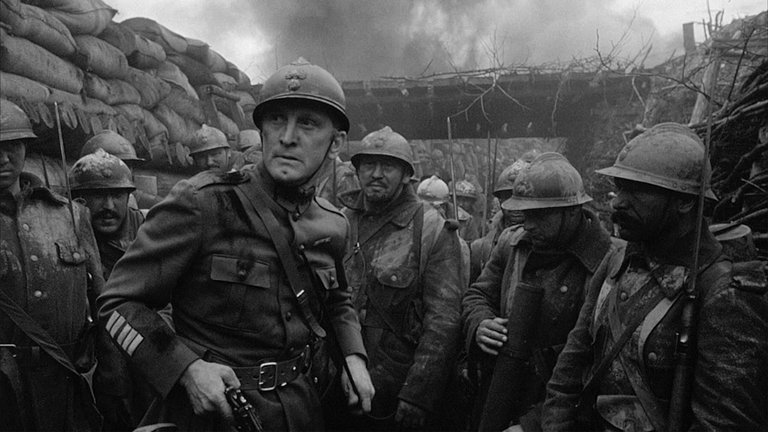
Stanley Kubrick, often considered one of the greatest directors, but also one of the greatest misanthropes in cinema history, made a film which defied its reputation and is now remembered as his most humanistic work. It was 1957 war drama Paths of Glory, nowadays considered as one of the greatest anti-war films in history of cinema.
Film is based on the 1935 novel by Humphrey Cobb, which was inspired by the real-life Souain corporals' affair in 1915 France during World War I. The plot is set one year later, when the situation on Western Front haven’t changed much and won’t change for next two years, with both sides stuck with frustratingly static and unimaginably bloody positional warfare. When ordered to take heavily fortified German position known as the "Anthill", Brigadier General Paul Mireau (played by George Macready), French Army division commander, is initially sceptical, but becomes enthusiastic when offered promotion by Major General Georges Boulard (played by Adolphe Menjou), corps commander and his superior. Task is to be carried out by 701st Infantry Regiment, led by Colonel Dax (played by Kirk Douglas). Assault turns into bloody fiasco, as most of regiment’s soldiers are mowed down by German machine guns and artillery, while the survivors refuse to leave the trenches. Enraged by what he interprets as cowardice, Mireau decides to punish regiment by randomly selecting three soldiers to be court-martialled and shot. Dax, who used to be defence counsel in civilian life, volunteers to represent them and desperately tries to save their lives.
Kubrick had previously explored the themes of war and inhumanity in his 1952 feature debut Fear and Desire, and would continue to revisit these subjects in later films.
Kubrick faced financial hurdles while making this film; studios were reluctant to fund a project set during World War I, which was, unlike “good” and just World War II, widely viewed as a senseless tragedy. Kirk Douglas, who also produced the film, allowed it to be made by co-producing it, albeit at the cost of altering the script to focus more on his character.
Shot in Bavaria and filmed in black-and-white, Paths of Glory showcases Kubrick's directorial prowess despite its modest budget. The assault over no man's land sequence demonstrates his talent for composition and tracking shots. He also expertly captures the claustrophobic life of ordinary soldiers in trenches and the contrast with luxurious chateau inhabited by officers in the rear.
However, it is the power of the story that truly resonates, with an ensemble cast portraying fallible, cowardly, ruthless, or insane characters. While Kirk Douglas delivers a solid performance, he is overshadowed by veteran actors such as Adolphe Menjou, who plays the most cynical and inhumane character, and George Macready, whose portrayal of the ambitious and lunatic General Mireau borders on over-the-top. Ralph Meeker stands out as one of the doomed soldiers, facing execution for doing the right thing.
Because of that, Paths of Glory is widely regarded as one of the greatest anti-war films ever made. By portraying the brutal realities of World War I, the film highlights the futility and senselessness of war. It challenges audiences to question the justifications for sending young men to their deaths and the callousness with which those in power order such sacrifices.
Kubrick, concerned over film’s commercial prospects, wanted to add conventional happy ending, but this was vetoed by Douglas. Instead, Kubrick took different route that made the point of the film even more powerful. In a departure from his typically bleak worldview, Kubrick includes a final scene in which Dax's soldiers, enjoying a brief respite from the horrors of the trenches, are moved by a captured German girl's song, rediscovering their shared humanity. This scene, which features the director's future wife Christine Harlan (credited as Susanne Christian), made Paths of Glory the most personal of all Kubrick’s films.
Paths of Glory, as Kubrick had feared, didn’t make much of a success at the box office, although the reviews were mostly positive. Unflattering portrayal of French military, on the other hand, didn’t sit well with French government, especially at the time of increasingly unpleasant and unpopular Algerian War. The film was banned in France, and this example was, on the account of anti-militarism and similar “subversive” stances, followed by Franco’s Spain and number of European countries, which, in turn, especially during Vietnam War, only made Kubrick’s work more famous and appreciated.
Although not as visually grand as some of Kubrick's later works, Paths of Glory remains one of the most important and influential anti-war films of its time. Today, with the increasing threat of new global conflict, the film's message is more relevant than ever, as new generations might face the same horrors as its protagonists.
RATING: 8/10 (+++)
Blog in Croatian https://draxblog.com
Blog in English https://draxreview.wordpress.com/
InLeo blog https://inleo.io/@drax.leo
Hiveonboard: https://hiveonboard.com?ref=drax
Rising Star game: https://www.risingstargame.com?referrer=drax
1Inch: https://1inch.exchange/#/r/0x83823d8CCB74F828148258BB4457642124b1328e
BTC donations: 1EWxiMiP6iiG9rger3NuUSd6HByaxQWafG
ETH donations: 0xB305F144323b99e6f8b1d66f5D7DE78B498C32A7
BCH donations: qpvxw0jax79lhmvlgcldkzpqanf03r9cjv8y6gtmk9
Posted Using InLeo Alpha